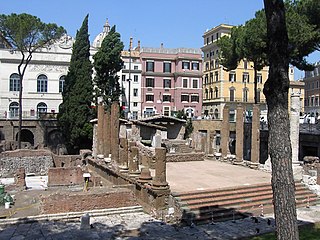Related Research Articles

Gaius Lutatius Catulus was a Roman statesman and naval commander in the First Punic War. He was born a member of the plebeian gens Lutatius. His cognomen "Catulus" means "puppy". There are no historical records of his life prior to consulship, but his career probably followed the standard cursus honorum, beginning with service in the cavalry and continuing with the positions of military tribune and quaestor.

In ancient Roman religion, the Flamen Martialis was the high priest of the official state cult of Mars, the god of war. He was one of the flamines maiores, the three high priests who were the most important of the fifteen flamens. The Flamen Martialis would have led public rites on the days sacred to Mars. Among his duties was the ritual brandishing of the sacred spears of Mars when the Roman army was preparing for war.
Lucius Postumius Albinus was a statesman of the Roman Republic.
The siege of Thala, part of the Jugurthine War, was an invasion of the Numidian town of Thala by a Roman army. The Romans were commanded by the proconsul Quintus Caecilius Metellus, the Thalans by an unknown Numidian commander. The Romans' main objective was to capture the Numidian king Jugurtha who was reported to be in Thala, but he escaped before the legions reached the fortress town. Metellus then besieged the town to get hold of one of Jugurtha's treasuries which was stored in Thala. The fortress town was besieged for forty days after which most of its inhabitants committed suicide by setting fire to the town.
Lucius Postumius Albinus was a Roman politician and general of the 3rd century BC who was elected consul three times. Most of our knowledge about his career and his demise comes from Livy's Ab Urbe Condita.
Aulus Postumius Albinus was a politician of Ancient Rome, of patrician rank, of the 3rd century BC.
Aulus Postumius Albinus Luscus was a politician of Ancient Rome, of patrician rank, of the 2nd century BC. He was curule aedile in 187 BC, when he exhibited the Great Games, praetor in 185 BC, and consul in 180 BC. In his consulship he conducted the war against the Ligurians.
Spurius Postumius Albinus Paullulus was a politician of ancient Rome, of patrician rank, of the 2nd century BC. He was praetor in Sicily in 183 BC, and consul in 174 BC. He was probably a brother of Aulus Postumius Albinus Luscus and Lucius Postumius Albinus, and perhaps obtained the agnomen of "Paullulus" by being small of stature, to distinguish him more accurately from his two brothers.
Lucius Postumius Albinus was a politician of ancient Rome, of patrician rank, of the 2nd century BC. He was curule aedile in 161 BC, and exhibited the Ludi Megalenses, at which Terence's play Eunuchus had debuted. He was consul in 154 BC, and died seven days after he had set out from Rome in order to go to his province. It was supposed that he was poisoned by his wife, Publilia.
Aulus Postumius Albinus was a statesman of the Roman Republic, notably consul in 151 BC. He was also a historian and wrote the Annals in Greek.
Lucius Postumius may refer to:
The gens Decia was a plebeian family of high antiquity, which became illustrious in Roman history by the example of its members sacrificing themselves for the preservation of their country. The first of the family known to history was Marcus Decius, chosen as a representative of the plebeians during the secession of 495 BC.

The gens Postumia was a noble patrician family at ancient Rome. Throughout the history of the Republic, the Postumii frequently occupied the chief magistracies of the Roman state, beginning with Publius Postumius Tubertus, consul in 505 BC, the fifth year of the Republic. Although like much of the old Roman aristocracy, the Postumii faded for a time into obscurity under the Empire, individuals bearing the name of Postumius again filled a number of important offices from the second century AD to the end of the Western Empire.
Lucius Postumius Albinus may refer to:
Lucius Furius Medullinus, of the patrician gens Furia, was a politician and general of the Roman Republic who was consul twice and Consular Tribune seven times.
Gaius Furius Pacilus Fusus was a Roman statesman of the early Republic. He was a descendant of the ancient patrician house of the Furii, which filled the highest offices of the Roman state from the early decades of the Republic to the first century AD. He was probably closely related to Quintus Furius Pacilus Fusus, whom Livy mentions as Pontifex Maximus in 449 BC, and was likely the father of Gaius Furius Pacilus, consul in 412 BC.
Gnaeus Fulvius Centumalus was consul of the Roman Republic in 229 BC, with Lucius Postumius Albinus as his consular colleague. He led part of the Roman forces in the First Illyrian War against Queen Teuta.
Titus Quinctius PoenusCincinnatus was a consul of the Roman Republic in 431 and 428 BC and a consular tribune in 426 BC. He might have been consular tribune again in 420 BC.
Quintus Fabius Vibulanus was a consul of the Roman Republic in 423 BC and a consular tribune in 416 and 414 BC.